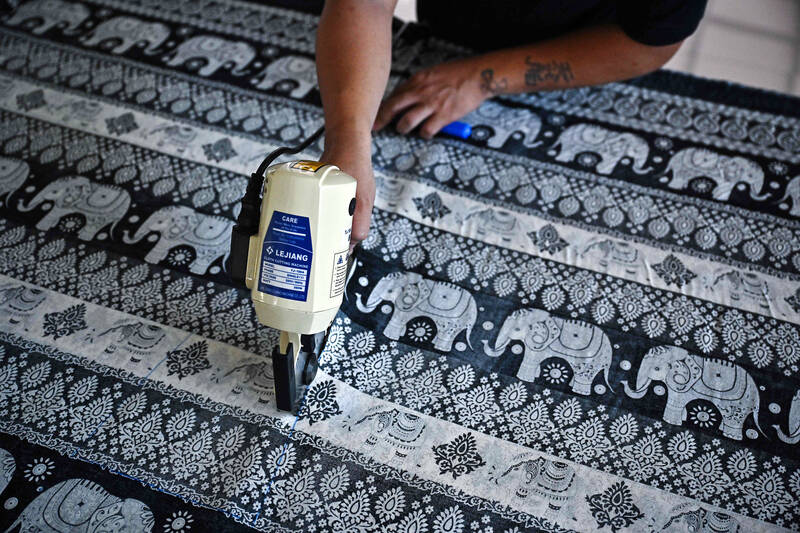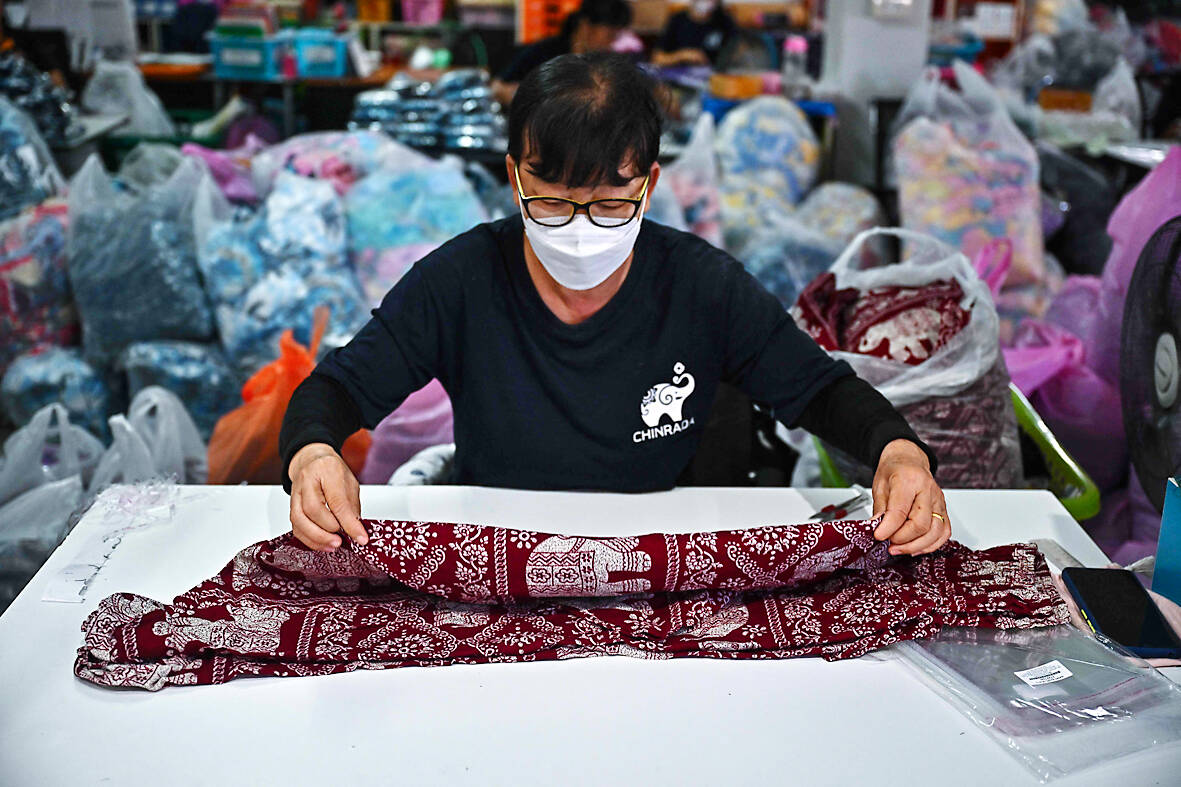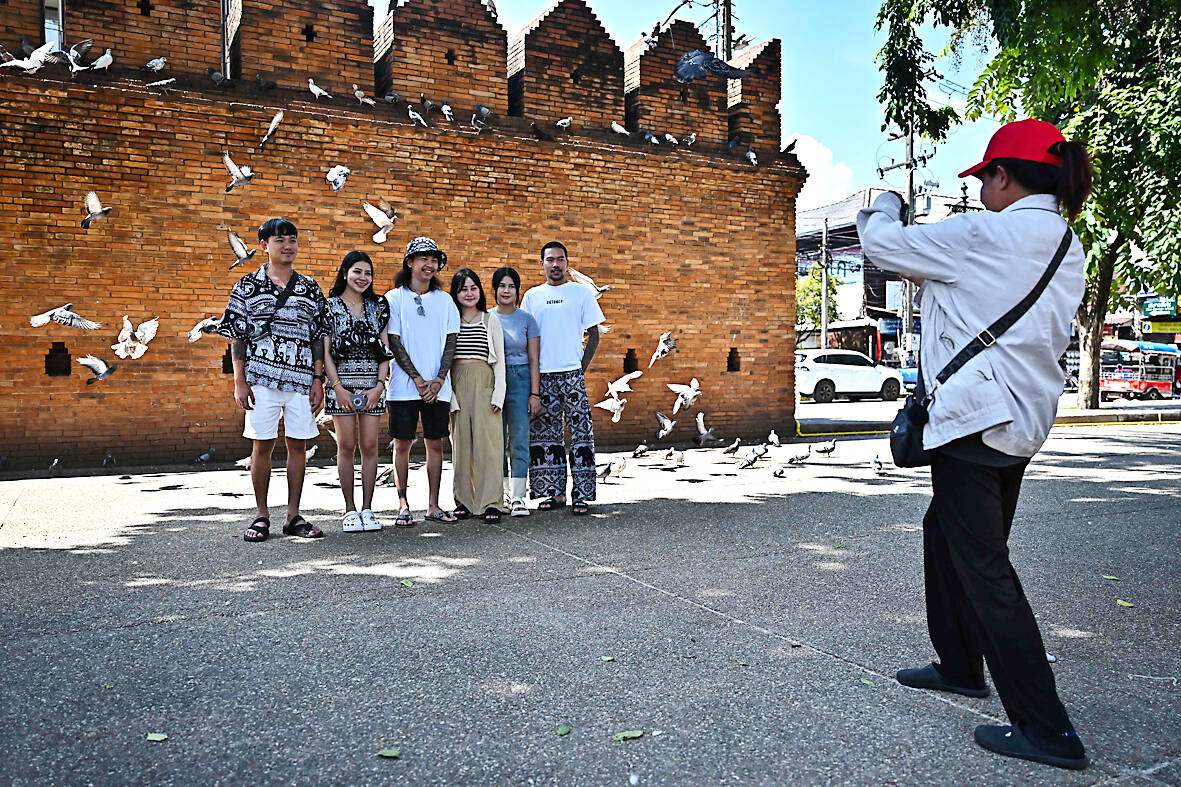An elegant Thai socialite poses in sunglasses, a designer handbag discreetly visible in the Instagram photo, her stylish outfit completed by a pair of... elephant print pants?
Infamous across Southeast Asia, so-called elephant pants made of thin baggy cotton were once synonymous with grubby backpackers in search of themselves -- and the nearest Chang beer, a popular local lager.
The pachyderm pants were adopted by foreigners during an early wave of budget Southeast Asia travel, as visitors sought to appropriate “authentic” culture, despite there being little truly Thai about them, researchers say.

Photo: AFP
While they are still sold from stalls alongside Bangkok’s tourist haven Khaosan Road for about 150 baht (US$4), young Thai influencers and the kingdom’s high society are increasingly reclaiming them.
“The pants are dope,” said influencer Dalintan “MoRich” Promphinit, after cavorting in a bright yellow set for his two million TikTok followers in April.
“They’re not just souvenirs foreign tourists buy,” he said. “Thais are rocking them too.” “It’s like a fashion statement,” with a “teen street fashion vibe,” said the 19-year-old. His fans instantly loved his latest look.

Photo: AFP
“They kept asking where I got it,” he said.
‘A SENSATION’
Posing at Chiang Mai’s ancient wall, Toei, 27, who only gave her first name, is clad head-to-toe in the “adorable” elephant print.

Photo: AFP
“Initially, they were a hit among tourists, but now they’re trending on TikTok, thanks to influencers,” her 28-year-old friend Ong, also sporting the print, added. “So, we embraced the trend.”
A half-hour drive away is Kingkarn “Jack” Samon’s factory, where rolls and rolls of pachyderm-inspired prints are measured, sliced and stitched.
“The pants have become a sensation in Thailand,” she said during a tour of the facility, which has around 100 workers, producing 1,000-2,000 items daily.
Orders — including shirts, dresses, even handbags — are up 30 percent since the end of the Covid pandemic. The pants account for 85 percent of sales.
Hers is just a small cog in the kingdom’s textile and garment industry, which accounts for about three percent of its GDP.
Kingkarn imports the fabric from China, shipping it to Bangkok for printing, before it returns to her factory, 700km away.
The design’s popularity, however, has not been without controversy.
An online debate brought local reporters to her door after some Cambodians claimed Thailand had appropriated the elephant print, Kingkarn said.
Refusing to be drawn on the latest iteration of the historic rivalry, she did admit with a grin: the debate has boosted sales.
‘THINK VERSACE’
Ultimately, little about the pants are Thai, said Kanjana Thepboriruk, an associate professor at Northern Illinois University’s Center for Southeast Asian Studies.
Their adoption by foreigners, attempting to stake a claim on “authentic experiences,” instead meant Thais viewed them as international, she said.
“I see the elephant pants as the latest way that young rich Thais or aspiring middle-class Thais align their identity with Westerners,” she said.
And high-end retailers have quickly cottoned on.
Inside a luxury Bangkok mall, Bangkok Tales’s elephant pants sell for 1,090 baht (US$30). “When people think about elephant pants, (they think of them as) really cheap, but I want to make them look like Versace,” explained founder and designer Rawiwan “Gigi” Worasinsiri.
Rawiwan initially targeted tourists, but the pandemic flipped her business model, with Thais filling the deficit.
“I was surprised,” she said, crediting TikTok for her success.
At the other end of the spectrum in Bangkok’s sprawling Chatuchak market, 32-year-old Onnitsa Kuren already owns three pairs.
“Elephant-patterned pants go with anything — just pair them with a T-shirt,” she said.
Musing as she browsed, she added, “I’m currently on the lookout for a red pair.”

In the next few months tough decisions will need to be made by the Taiwan People’s Party (TPP) and their pan-blue allies in the Chinese Nationalist Party (KMT). It will reveal just how real their alliance is with actual power at stake. Party founder Ko Wen-je (柯文哲) faced these tough questions, which we explored in part one of this series, “Ko Wen-je, the KMT’s prickly ally,” (Aug. 16, page 12). Ko was open to cooperation, but on his terms. He openly fretted about being “swallowed up” by the KMT, and was keenly aware of the experience of the People’s First Party

Aug. 25 to Aug. 31 Although Mr. Lin (林) had been married to his Japanese wife for a decade, their union was never legally recognized — and even their daughter was officially deemed illegitimate. During the first half of Japanese rule in Taiwan, only marriages between Japanese men and Taiwanese women were valid, unless the Taiwanese husband formally joined a Japanese household. In 1920, Lin took his frustrations directly to the Ministry of Home Affairs: “Since Japan took possession of Taiwan, we have obeyed the government’s directives and committed ourselves to breaking old Qing-era customs. Yet ... our marriages remain unrecognized,

During the Metal Ages, prior to the arrival of the Dutch and Chinese, a great shift took place in indigenous material culture. Glass and agate beads, introduced after 400BC, completely replaced Taiwanese nephrite (jade) as the ornamental materials of choice, anthropologist Liu Jiun-Yu (劉俊昱) of the University of Washington wrote in a 2023 article. He added of the island’s modern indigenous peoples: “They are the descendants of prehistoric Formosans but have no nephrite-using cultures.” Moderns squint at that dynamic era of trade and cultural change through the mutually supporting lenses of later settler-colonialism and imperial power, which treated the indigenous as

Standing on top of a small mountain, Kim Seung-ho gazes out over an expanse of paddy fields glowing in their autumn gold, the ripening grains swaying gently in the wind. In the distance, North Korea stretches beyond the horizon. “It’s so peaceful,” says the director of the DMZ Ecology Research Institute. “Over there, it used to be an artillery range, but since they stopped firing, the nature has become so beautiful.” The land before him is the demilitarized zone, or DMZ, a strip of land that runs across the Korean peninsula, dividing North and South Korea roughly along the 38th parallel north. This